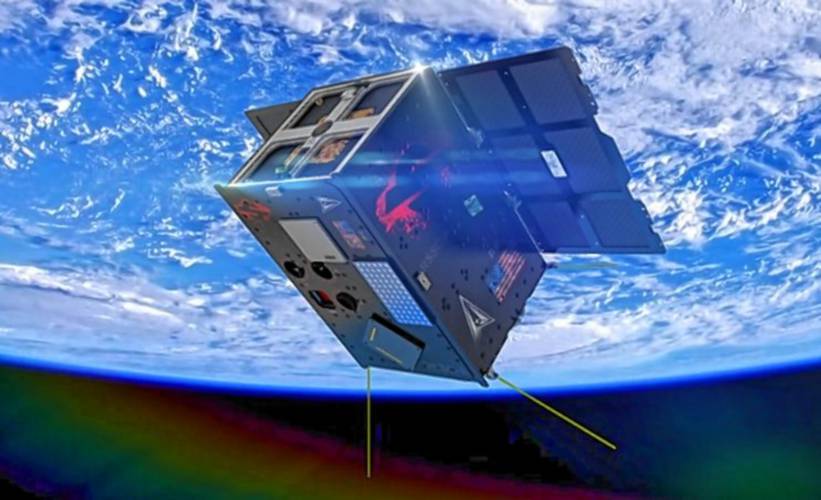|
An artist's rendition of Barry-1 in flight. (Courtesy of Rogue Space Systems) If you were told that a New Hampshire startup launched its first payload Saturday en route to creating autonomous robots that can fix satellites in orbit, where would you think it was located? Probably with the tech firms in Nashua or Manchester. Perhaps alongside the Pease airport. Maybe near the space folks at UNH. You definitely wouldn't guess the scenic Lakes Region town of Gilford. But you would be wrong. "This is not where you would expect a space company to be," said Jeromy Grimmet, a founder of Rogue Space Systems, which was born in a Laconia mill building three years ago and now operates out of a commercial strip mall on Route 3. Rogue Space Systems is developing in-space service technology to monitor and repair satellites in orbit, and perhaps eventually tackle the problem of space debris. Its first satellite, called Barry-1 after a bat that flew around their Laconia offices and became a sort of company mascot, launched Saturday, one of multiple small satellites carried atop a SpaceX Falcon 9 rocket. It will test various algorithms and other systems, testing sensors and software to see if it can identify and track other satellites. The electronics package was created by Rogue Space, with final assembly handled by Endurosat, a small satellite builder in Bulgaria. If all goes well, a second launch in early 2025 will send up a satellite that will test how to maneuver close to another orbiting object "close proximity operations" in space-talk and then a third launch will send up a satellite with autonomous robotic arms that should be able to work on other satellites. This is cutting-edge stuff that seems more attuned to Cape Canaveral than Paugus Bay. "People ask why aren't we in Colorado or Texas or Florida or California, where the space industry is more predominant," he said in a Friday interview from California, where he was awaiting Saturday's launch of Barry-1 from Vandenberg Space Force Base. The answer to that question is simple, said Grimmet: "I don't have to be there." The Internet makes it possible for about half the 30-person company to be elsewhere without affecting productivity. "There are some benefits to not being in those places: You're not in the noise. The space industry has a lot of noise in it, and if you're in the middle of all that, it's easy to get caught up and lose a lot of focus on what you're trying to do," he said. "There's a gravitas about this location, the natural beauty, outdoor activity. It allows people to take a deep breath. You go to work and it's an intense environment the moment I step outside there's a decompression you get when you're off the beaten path." "In larger places it's stress on top of stress on top of stress. Not here." Grimmett moved to Alton in 2012 as part of an I.T. job and loved it, so when the time came to start a company, he stayed. The usual concern of a tech startup in an out-of-the-way location is luring enough engineers but acceptance of remote work, supercharged by the COVID pandemic, has solved much of that worry. "I thought, why try to force everybody to come to one spot? Pretty much our entire business has been built around a remote workforce," he said. Rogue has a clean room at its Gilford site and does some other manufacturing there, and uses facilities in other New Hampshire locations such as machining at UNH. They're looking to expand their presence here for upcoming missions but will remain a far-flung entity, Grimmet said. White Grimmet extolled the benefits of being located in New Hampshire, he wasn't shy about drawbacks of a state government that spends little. "In other states like Massachusetts, there's a lot of support, a lot of money there to help drive those ecosystems for tech," he said. Not having that in the Granite State "hurts, it hurts quite a bit." Grimmet described the company's focus as "sustainability in space" by extending the life of spacecraft through monitoring and repairs. The main payload in the satellite Barry-1 is six cameras and a computer that will be tested in flight, both to get design feedback and "give it some space heritage in preparation for the next launch," Grimmit said. Rogue's systems are largely autonomous, using artificial intelligence and machine learning to make decisions on the fly so they don't require constant connection with and instruction from the ground. The U.S. Space Force has provided he company with about $7.5 million in funding over past couple years "They like us a lot," Grimmet said and there are more proposals in the pipeline. It has also been awarded grants from the SpaceWERX Orbital Prime initiative to promote innovative space startups. The company is also raising a seed round of private funding. "We put out a very measured, very deliberate program that advances capability in each successive launch. At first we were going to try and put everything in one spacecraft and we were going to go, go, go! But we decided to dial it back," he said. "That seems to be working better." |
These articles are being shared by partners in The Granite State News Collaborative. For more information visit collaborativenh.org.


 Current Issue - April 2024
Current Issue - April 2024